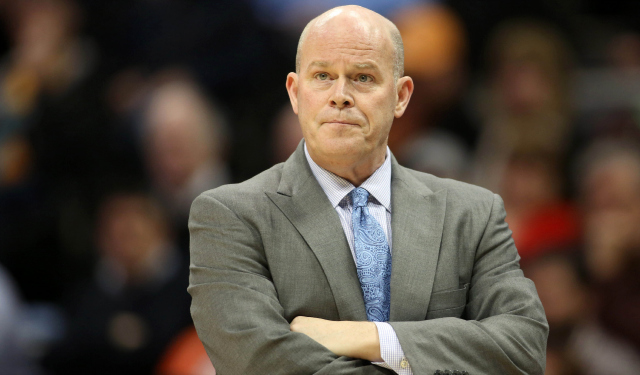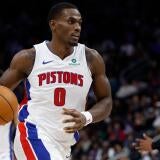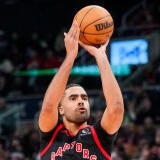Q&A: Hornets coach Steve Clifford on Lance Stephenson, MKG, more
Charlotte head coach Steve Clifford discussed the team's offseason and much more in an extensive interview.

Steve Clifford turned around the Bobcats last season. A coach's son who had 12 years of NBA experience learning from Jeff and Stan Van Gundy before spending the 2012-2013 season on the sideline for the Los Angeles Lakers circus, Clifford came to a Charlotte franchise that had been down in the dumps. You know the story by now: he reinvigorated the defense in his first year as a head coach, newcomer Al Jefferson earned All-NBA accolades and the team made a 22-win improvement, returning to respectability and the postseason.
His second season will be a new challenge. The Hornets are back, and fans routinely stop Clifford on his walk to work to tell him they’re excited about the name change. With free-agent acquisition Lance Stephenson in the fold, there’s some good momentum for the first time in a long while. Clifford is pumped about bringing in another player from a great defensive system, and he knows Stephenson can help the team put more points on the board.
“Offensively, he really has the ability to do everything,” Clifford said.
In a phone interview, Clifford discussed the changes in Charlotte and more:
How often do you still accidentally call the team the Bobcats?
Never. I’m actually, you know, what, so far, knock on wood, I’ve been good with that. I’m all-in with the Hornets and I’ve been able, so far, to make that adjustment pretty quickly.
You’ve said your first year with the team was about establishing a foundation. What’s the second year about?
I think that the biggest thing, when we start in October, that we have to lock in on is starting again from the very beginning. Again, establishing that we’re going to be a team that’s going to try to play with balance. I think you have to start over every year. Last year, we were very good defensively, but that doesn’t mean that we’re going to just show up and play good defense this year. We put a lot into it and the guys did a great job with it and we’ll have to do that equally as well. But we have to get better on offense. To win big in this league, you have to play well in all aspects of the game.
Lance Stephenson always kind of seemed like a natural in Charlotte if he decided to leave Indiana. When did you first start thinking about him coming to the team?
One of the things that we were looking at was, as an organization, we knew it was important to try to add someone to play through offensively at the top of our roster. And there were a couple trade possibilities that we looked at that didn’t work out, and then obviously we tried hard with Gordon [Hayward] and then Utah matched. As soon as that happened, then we were really aggressive about going after Lance.

What happens when you make a major signing like that? Are you watching all his possessions the next day, calling people who’ve coached him?
I think any piece, to be honest, major or minor, you study so that you can get up to date on his game, strengths, weaknesses as quickly as possible. A lot of film work. Like you said, phone calls with people that have been around him, know him. And then try to spend as much time with him as possible and talking to him and trying to establish [a relationship].
I think coach-player communication can start now. Obviously how it will develop is more impacted by practices, game and the season, but we just spent a few hours together in New York. I flew up there a couple weeks ago. We sat down, talked about his role, what I see. We’ve spoken quite a few times on the phone and we have voluntary or optional workouts in September that he’s going to come to. Hopefully, by the time we start in October, that line of communication will be advanced a little bit.
Speaking of communication, the reputation you have is that you’re very demanding of your players, but they tend to really respect you and like playing for you. How do you walk that fine line?
I really think that my philosophy of how to coach NBA players was determined by the guys that I worked for and with. Obviously, Jeff Van Gundy, Stan Van Gundy, working with Tom Thibodeau, Mike Brown, Mike D’Antoni, Don Chaney, I was really fortunate to work for guys that are terrific coaches and really good communicators. So really, I guess the way I do it or my comfort level with doing it really comes from the things that I learned from them. I spend a lot of time with the players, as did all of those guys. We have really direct, honest, I think, player-coach relationships. Everything is out there all the time.
Coaches say you never really know a player until you’ve coached him. What did you learn about Al Jefferson and Kemba Walker?
I would say the biggest thing that was important with Al was that, look, I knew he could score and we knew he could rebound. He’d done that for a long time. But in terms of his competitiveness and how badly he wanted to win, those were, I think, the keys in our team doing a good job and also in him having such a terrific year. He’s a good leader and a good teammate, but the biggest thing is he came here and he accepted the responsibility of being the best player and he badly wanted to win. That was a big factor in our team having a year that we were happy with.
With Kemba, I think Kemba’s competitiveness I understood from competing against him, but the thing that he did last year was he put in so much work before and after practice, on off days. And his pick-and-roll game really started to take off. So if you look at his shooting numbers, people wouldn’t see the improvement, but his assist numbers, and you can look this up, but I think his assist numbers the last three months of the year actually went up close to one assist per month [Note: Walker averaged 5.4 assists per game in December, 6.3 in January, 7.3 in February, 7.5 in March, 8.5 in April]. And that’s when our team started playing a lot better on offense. And it was strictly that he started going from a guy that made a lot of offensive scoring plays in pick-and-rolls to continuing to score but making a lot more plays for his teammates.

Does part of that come from you sitting down with him and looking at film, saying, ‘This is a pass that’s available?’ How hands-on does it get with these minor adjustments?
Oh, yeah. And [assistant coach] Mark Price, I felt like, helped him a ton. Mark was obviously a terrific player in the league. Jeff Van Gundy told me Mark Price was Steve Nash before Steve Nash. I feel like Mark has helped Kemba, not just with his skill development but just with being an NBA point guard, knowing what to look for, so yeah. And he watches film with him, I watch film with him. But again I think a lot of it is, one, I’m fortunate to have the staff that I have here, two, at the end of the day the thing about Kemba — and Al’s the same way — is they take responsibility for their own play. And that’s what the better players do. When you have an attitude like that, when making progress and getting better and winning is your priority, that makes the coaching part a lot easier.
Obviously Mark’s done a lot of work on Michael Kidd-Gilchrist’s shot, too, and he’s someone who a lot of people think would be a star with a good jumper. How do you deal with that situation, in wanting him to have confidence in it and develop it but not wanting him to hurt the team by taking shots that won’t be efficient?
Well, I think he’s going to be in a different place this year offensively because he spent so much time on his shooting mechanics with Mark this summer. And now the next aspect of his offense is going to be simply those things you talked about — his decision making, when to shoot, when to drive, when to pass. And yet, for him to play really well, his shooting is not going to be the key. His strengths have to remain his strengths. He’s got great defensive ability, he’s a terrific competitor and he brings an aggressiveness and a competitiveness to the team when he’s on the floor. If you look at our team last year, we were a much different team when he was able to play versus during the stretch of games when he got hurt and was out.
He has his way to play, and at the end of the day, for almost every player, playing to your strengths, night in and night out, knowing what you have to do to play well, usually determines the kind of week you have, month you have, season that you have. And he knows what he has to do to play well, and I think that, as he gets older, the challenge for every guy is consistency. He had stretches last year where he was terrific and he had other stretches where he wasn’t as good. I do know this: he’s had a summer where he’s put a ton of work in up on the floor with Mark and then also in the weight room with our strength coach Matt Friia and I think he’s ready to have a really good year.

I know you’ve talked a lot about transitioning from assistant coach to head coach last year. The other transition you made was going from a really crazy Lakers team with those expectations, injuries and a head-coaching change, to a completely different situation in Charlotte. What was it like going from one to the other?
Yeah, no, I totally agree. I would say this: the year in LA for me was a terrific learning experience as a coach in many ways. To be honest, being able to watch those guys, particularly Kobe and Steve Nash and the way they worked every day, the way they took care of themselves, the way they trained to get ready for the season, was a learning experience. I think that the expectations and then how guys were forced to try to kind of blend together to become a better team, and then obviously the coaching change was something that we all dealt with.
But here’s the thing that people don’t give those guys credit for: we were 28-12 the last 40 games of the season last year, which I think was either the fourth or fifth best record in the NBA. So once they got more comfortable with each other and they all got on the same page in terms of what they had to do to win, we really played well. I mean, that’s good basketball. And then the last 10 games of the season, when Kobe went down he had played so, so well. And then Steve went down. Then Steve Blake went down. Then Metta [World Peace] went down. I think going into that, if we would have been healthy, I would think that we would’ve been one of the teams that nobody would’ve wanted to play in the playoffs.
People, I think, know about the Van Gundy connection and the guys you’ve worked with. I’m not sure they know about your connection with Brett Brown, having worked under his father. What was it like to both get your shot as a head coach at the same time?
Brett’s dad, I mean, I call him coach Brown. I worked for him at two different schools: a Division-II school in New Hampshire, St. Anselm College, and then I worked for him at Boston University also. I’ve been really fortunate to have worked for terrific coaches, both in the NBA and in college, and I worked for him for five years total. He’s a master coach. In New England, he’s an absolute legend. He’s a guy that I still call today for advice when I have questions. Just a great man and a great coach and I’m so fortunate that I had an opportunity to be around him. And it is ironic, ‘cause Brett and I have been friends for a long time, that we both got the chance to be head coaches the same year. We laugh and get on the phone. We talk. I mean, in this league you don’t spend a lot of time on the phone with other coaches, but we catch up from time to time and talk basketball and talk about the league. But there’s definitely irony there.
Jeff hired you as an advanced scout in 2000 — with the way video has changed so much in terms of the ease of acquiring it, editing it, working with it, how different is it for coaching staffs and front offices now?
Oh, man. Listen, back then, we used to watch the tapes. Even when you were traveling, I mean, I can remember being a scout and going from city to city where they would forward tapes to the hotels and you traveled with a way to watch the tape. Everybody would get it differently, or you rented a tape player in the hotel so you were able to watch tape. And even, my first couple of years on the bench with the Knicks, we all had these big boxes that we took from city to city and they would roll them into your hotel when you got there. And everything was tapes. Now, whatever, you turn on the computer and everything is right there. It’s so much easier.
I know you were a big Josh McRoberts guy and you wanted to have him back. Do you feel like the offseason additions mean you can sort of make up for what you’re losing from him?
Yeah, I mean that’s what we’re hopeful of. I mean, listen, Josh was a big part of things last year. Not just offensively, but defensively, and we were sorry to see him go and disappointed that he decided to leave. But we’re excited about the guys that we brought in. In this league, [where] change happens all the time, it is how quickly you adapt to change and, as coaches and players, we embrace change. This is our team, I like our team, I like the possibilities of what we can become. We lost Josh, we also lost some other guys who were a big part of the success that we had last year. Chris Douglas-Roberts, Anthony Tolliver, Luke Ridnour were all guys who played significant roles, too. Those are the things that we’ll have to work out in October, and I am a huge McRoberts fan, but I like our roster and, like I said, I’m excited about the possibilities.

















